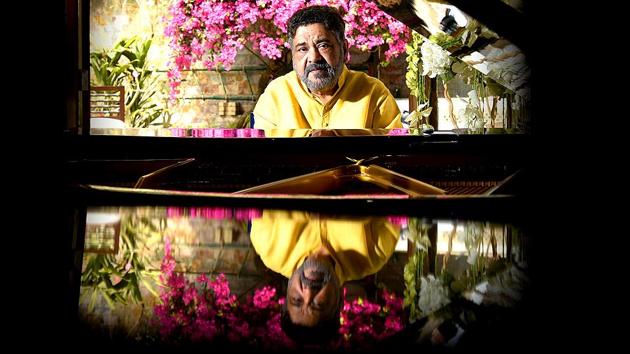Old Hindi songs are embedded in my soul, says pianist Brian Silas
The self-taught Delhi artiste celebrates two decades of performing, this year.
Pink bougainvillea in full bloom outside, a piano the colour of midnight and the lilting strains of ‘Main zindagi ka saath nibhata chala gaya’. There are few things that can put you more in charity with the world than to hear pianist Brian Silas play on a Delhi spring day.

Silas is that rare pianist who is not enamoured of Western classical music. Instead his heart, and piano, belong to soulful, old Bollywood songs. This makes his melodies at once familiar and magical, when songs you know are transformed by the tinkle of ivory. “Certain songs just sound extraordinary on the piano,” says Silas. “That’s why they call it the king of instruments.”
On April 3, Silas will perform at a concert to celebrate 20 years of him playing music on stage. His first association with the piano, however, goes back to his school days at Kanpur’s Methodist High School, and his music teacher Mrs Behera. Those early lessons were not a success. “Neither of us had the patience,” laughs Silas.
But that early brush with the instrument sparked a lifelong romance. “I wouldn’t have been a musician if it were not for this craving to play the piano,” Silas says.
He quit his job as a marketing manager with an entertainment centre and started playing the piano professionally at 34; he has never in fact learnt how to read music. His technique is to play by ear, his compositions reflecting a combination of skill and instinct. “It was like a gift from God,” says Silas. “Whatever I heard once, I could reproduce it on the keyboard.”
Playing old Bollywood classics on the piano takes rare skill. Indian melodies are based on ragas, where there’s continuity in the music. The piano, on the other hand, is an instrument on which the sound breaks. To add to this, the old masters of Indian music set their songs to full orchestra, while Silas is almost a one-man show, trying to play the role of violin and flute too, through keys and chords.
But to hear Silas play, you’d never know of these complexities because the music flows so easily. “Since childhood, we heard all these songs chalte phirte on the radio… they are all inside the system, embedded,” he jokes. During concerts, the audience starts clapping along or humming the words. Sometimes Silas finds himself humming under his breath too.
While he is a mine of talent, it is his wife Ravinder Kaur who has moulded him as a public artist, pushing him to perform on stage. “He is not ambitious at all, but if even one person is listening, he will play happily,” Kaur says.
Aptly, Kaur first heard Silas and then met him. “He was playing these old songs at a restaurant, and I suddenly realised he was playing them on the piano! We moved our seats closer to the stage to hear him properly,” she recalls.
She learnt how to play the piano from Silas too, but found it tough going since he doesn’t dictate musical notations. “His talent comes instinctively, but I’m a learner, I need to practice,” she says. So while she was learning, she devised a technique where she heard the music, simplified the notes and wrote them down. Years later, when the couple opened their own school where Silas gave piano lessons, many students relied on Kaur’s technique to help them.
Kaur stopped playing the piano after the two got married. “When someone plays that well, it is more of a pleasure to sit and listen,” she says. But she remains Silas’s closest collaborator, organising his concerts and pushing him to perform.
The other collaborator is Silas’s beautiful piano, a custom-made C Bechstein he got for his 50th birthday in 2007, his name engraved on it in gold lettering. “I am open to the idea of playing newer Bollywood songs as well, but these songs won’t fade away,” he says.






